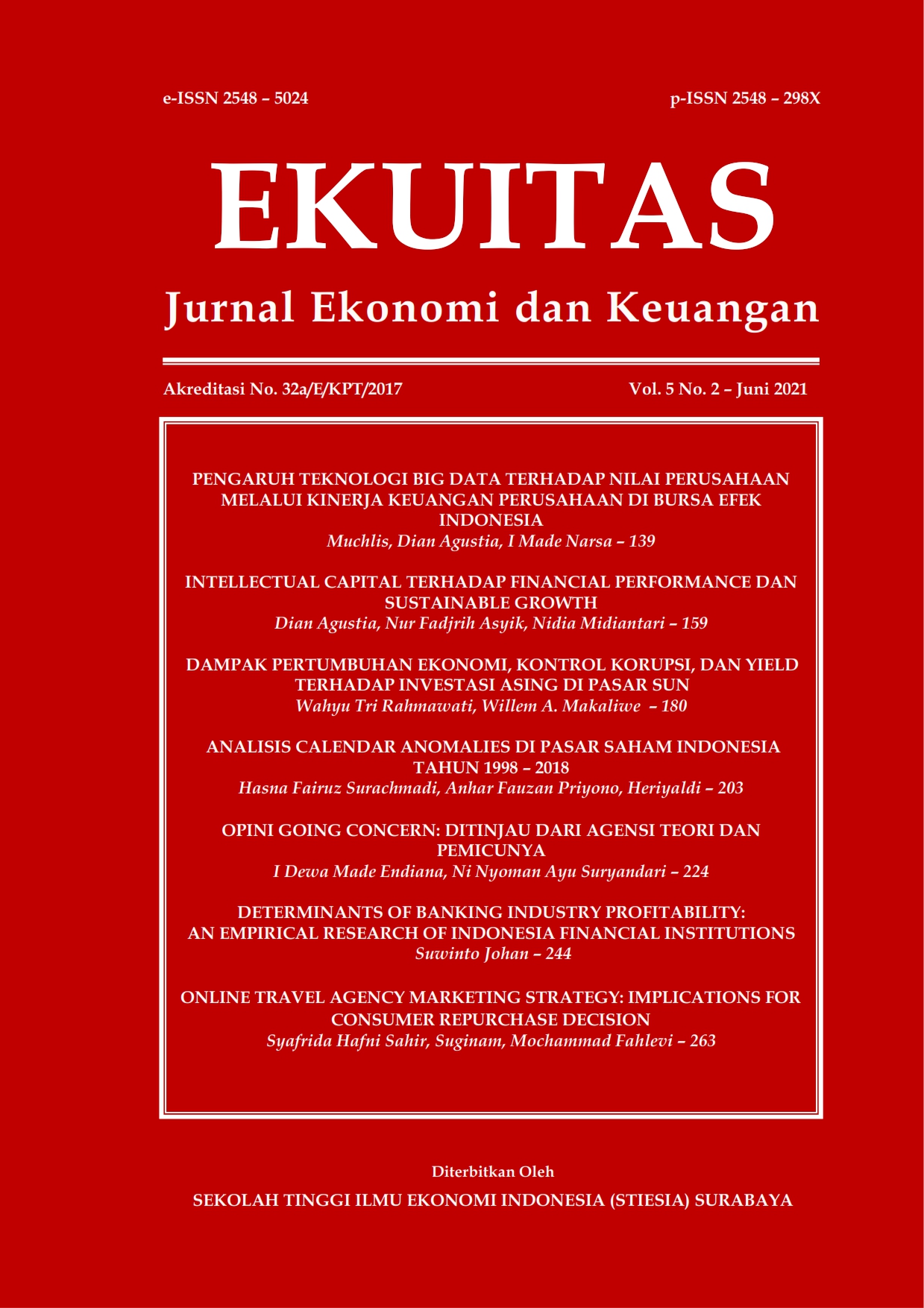ANALISIS CALENDAR ANOMALIES DI PASAR SAHAM INDONESIA TAHUN 1998 – 2018
DOI:
https://doi.org/10.24034/j25485024.y2021.v5.i2.4511Keywords:
day-of-the-week effect, January effect, GARCH-M, market anomaliesAbstract
ABSTRACT
The Efficient Market Hypothesis Theory of Fama states that stock prices cannot be predicted by its movement tendency (random walk). In some stock markets, the movement of stock prices has a seasonal effect, which is the repetition of stock movements at a certain time that can be called a calendar anomalies. The repetition or seasonal effect on rate of return shows that the stock price can be predicted, thus it can be exploited by investors to get the probability of a higher rate of return. This research aims to see whether calendar anomalies prevail in the Indonesian stock market by using the daily and monthly rate of return of LQ45 and the Jakarta Composite Index (JCI) with an observation period of 21 years from 1998 to 2018 and estimated using the GARCH-M model (1,1). The results of this research are the existence of daily anomalies on Monday as the day with the lowest rate of return and Wednesday as the day with the highest rate of return. In addition, we also get the results of monthly anomalies in August as the month with the lowest rate of return and December as the month with the highest rate of return.
References
Agnani, B. dan H. Aray. 2011. The January Effect Across Volatility Regimes. Quantitative Finance 11(6): 947–953.
Ariss, R. T., R. Rezvanian, dan S. M. Mehdian. 2011. Calendar Anomalies in the Gulf Cooperation Council Stock Markets. Emerging Markets Review 12(3): 293–307.
Berument, M. H. dan N. Dogan. 2012. Stock Market Return and Volatility: Day-of-the-Week Effect. Journal of Economics and Finance 36(2): 282–302.
Bollerslev, T. 1986. Generalized Autoregressive Conditional Heteroskedasticity. Journal of Econometrics 31(3): 307–327.
Borges, M. R. 2010. Efficient Market Hypothesis in European Stock Markets. The European Journal of Finance 16(7): 711–726.
Bursa Efek Indonesia. 2019. Saham. https://www.idx.co.id/produk/saham/.
Chris, B. 2014. Introductory Econometrics for Finance, 3rd Edition. Cambridge University Press. United Kingdom.
Engle, R. 2001. GARCH 101: The Use of ARCH/GARCH Models in Applied Econometrics. Journal of Economic Perspectives 15(4): 157–168.
Fama, E. F. 1991. Efficient Capital Markets: II. The Journal of Finance 46(5): 1575–1617.
Fields, M. J. 1931. Stock Prices: a Problem in Verification. The Journal of Business of the University of Chicago 4(4): 415–418.
Fitriyani, I. 2013. Analisis January Effect pada Kelompok Saham Indeks LQ-45 di Bursa Efek Indonesia Tahun 2009-2011. E-Jurnal Akuntansi: 421–438.
Gitman, L. J. dan C. J. Zutter. 2015. Principles of Managerial Finance, Global Edition. Pearson Education Limited.
Guidi, F., R. Gupta, dan S. Maheshwari. 2011. Weak-form Market Efficiency and Calendar Anomalies for Eastern Europe Equity Markets. Journal of Emerging Market Finance 10(3): 337–389.
Investing. 2020a. Jakarta Stock Exchange Composite (JKSE). https://id.investing.com/indices/idx-composite.
Investing. 2020b. Jakarta Stock Exchange LQ45 (JKLQ45). https://id.investing.com/indices/jakarta-lq45.
Lo, A. W. 2016. What is an Index? The Journal of Portfolio Management 42(2): 21–36.
Malkiel, B. G. dan E. F. Fama. 1970. Efficient Capital Markets: A Review of Theory and Empirical Work. The Journal of Finance 25(2): 383–417.
Mishkin, F. 2016. The Economics of Money, Banking, and Financial Markets. Encyclopedia of Finance (11th ed.). Pearson International. https://doi.org/10.1007/0-387-26336-5_857.
Perez, G. 2018. Does the January Effect Still Exists? International Journal of Financial Research 9(1): 50–73.
Simbolon, I. P. 2015. January Effect of Stock Returns in Indonesia: The Unconditional Method and the Conditional Method. International Business Management 9(6): 1221–1225.
Undang-Undang Republik Indonesia Nomor 8 Tahun 1995 tentang Pasar Modal.
Urquhart, A. dan F. McGroarty. 2014. Calendar Effects, Market Conditions and the Adaptive Market Hypothesis: Evidence from Long-run US data. International Review of Financial Analysis 35: 154–166.
Wachtel, S. B. 1942. Certain Observations on Seasonal Movements in Stock Prices. The Journal of Business of the University of Chicago 15(2): 184–193.
Yahoo Finance. 2020. Jakarta Composite Index (JKSE). https://finance.yahoo.com/quote/%5EJKSE/.
Zhang, J., Y. Lai, dan J. Lin. 2017. The Day-of-the-Week Effects of Stock Markets in Different Countries. Finance Research Letters 20: 47–62.














